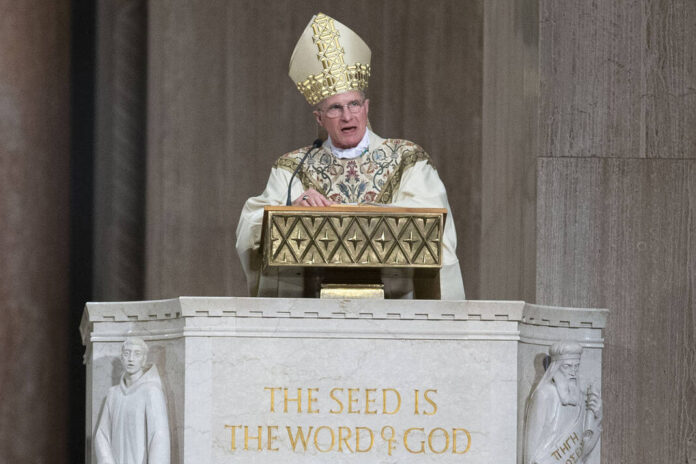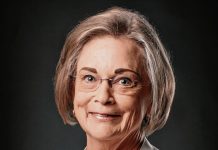
Archbishop Timothy Broglio conducts an Easter Sunday Mass at Basilica of the National Shrine of the Immaculate Conception in Washington on Sunday, April 12, 2020. Broglio of the Military Services, who oversees Catholic ministries to the U.S. armed forces, was elected Tuesday as the new president of the U.S. Conference of Catholic Bishops.
Associated Press
BALTIMORE — Archbishop Timothy Broglio of the Military Services, who oversees Catholic ministries to the U.S. armed forces, was elected Tuesday as the new president of the U.S. Conference of Catholic Bishops.
Broglio, 70, was elected to a three-year term from a field of 10 candidates. He will succeed Archbishop Jose H. Gomez of Los Angeles, who assumed the post in 2019.
The archbishop of Baltimore, William Lori, was elected as the conference’s new vice president.
Usually the election of a new USCCB leaders is a formality, with the bishops elevating the conference’s vice president to the post. But this year’s election was wide open because the incumbent VP — Detroit Archbishop Allen Vigneron — will turn 75 soon, making him ineligible to serve.
The 10 candidates ranged from the relatively moderate Archbishop Paul Etienne of Seattle to San Francisco Archbishop Salvatore Cordileone, a staunch conservative. Cordileone made headlines this year by barring House Speaker Nancy Pelosi, a San Franciscan, from receiving Communion in the archdiocese because of her support for abortion rights.
The candidates were nominated by their fellow bishops, who bypassed several of their colleagues who have been elevated to cardinal by Pope Francis.
While Broglio was not considered as hardline a conservative as a few other candidates, his election was not welcomed by some left-of-center Catholics who empathize with Pope Francis in his occasional conflicts with the U.S. bishops.
“I’m disappointed Catholic bishops chose a new president who has a history of being a culture warrior,” said John Gehring, Catholic program director at a Washington-based clergy network called Faith in Public Life. “Even as Pope Francis offers a better path forward for the church, too many American bishops double down on old strategies that have failed to engage and energize the faithful.”
The gathering was the first since the U.S. Supreme Court in June overturned the Roe v. Wade decision, which had found a constitutional right to abortion and returned the question of legal abortion to the states.
Lori, chairman of the bishops’ Committee on Pro-life Activities, acknowledged that many Catholics favor legalized access to abortion.
“The demise of Roe is a great victory, but it will be a pyrrhic victory if we fail to win in the minds and hearts, first and foremost of our fellow Catholics,” said Lori, who was elected vice president of the bishops’ conference.
“We cannot credibly speak in a polarized society as long as our own house is divided,” he said. “At the same time, we cannot wait until perfect unanimity has been attained before we bear witness to the ambient culture about human life and dignity.”
AP VoteCast, an expansive survey of voters in the 2022 midterm elections, found that Catholic voters in Michigan split about evenly on a referendum enshrining abortion rights into the state constitution, while 60% of Catholic voters in Kentucky voted against an anti-abortion constitutional amendment.
Broglio — a staunch opponent of abortion — has extensive experience outside U.S. borders, having studied in Rome and serving in the Vatican’s diplomatic corps.
Broglio worked as chief of cabinet for the late Cardinal Angelo Sodano, who was Vatican secretary of state, from 1990 to 2001. Sodano has been widely criticized for stalling investigations into prominent clerics found to be sexual abusers, such as the Rev. Marcial Maciel, leader of the Legion of Christ, a religious order.
“Hindsight is always 20/20,” Broglio said at a news conference after his election. “Many things that we’ve learned now perhaps certainly weren’t known then.”
He said that during his tenure, Maciel “had everyone fairly well buffaloed” because he was recruiting so many new priests.
Broglio said he had left the secretary of state’s office “by the time the great accusations came out” against Maciel.
While allegations against Maciel did grow in the 2000s, they initially came to light in a major report in 1997 by the Hartford Courant, which reported accusations by eight men against him.
The experience is a “good reminder that we have to be attentive and be proactive,” Broglio said.
Broglio also stood by an earlier statement in which he linked the church’s sexual abuse crisis to homosexuality. He had previously stated that many cases of abuse involved homosexuality rather than pedophilia because many of the victims of abusive priests were 12 and over.
A 2011 study by the John Jay College of Criminal Justice, commissioned by the bishops, said homosexuality was not a cause of abuse by priest.
“It’s certainly an aspect of the sexual crisis that can’t be denied,” Broglio said Tuesday. “That’s certainly not to point a finger at anyone but I think it would be naive to suggest that there’s no relationship between the two.”
Broglio declined to speculate on why he was elected or whether the vote signaled a different agenda from the pontiff’s.
“I’m certainly in communion with Pope Francis,” he said. “I’m not aware that this necessarily indicates some dissonance with Pope Francis.”
Last year, Broglio attracted national attention when he asserted that servicemembers should be able to get religious exemptions sparing them from the Pentagon’s mandate that all troops receive COVID-19 vaccinations.
“Notwithstanding the moral permissibility of these vaccines, the Church treasures her teaching on the sanctity of conscience,” said Broglio. “Accordingly, no one should be forced to receive a COVID-19 vaccine if it would violate the sanctity of his or her conscience.”
Broglio grew up in the Cleveland area, attending Catholic schools there before attending Boston College and then earning a doctorate in canon law from the Pontifical Gregorian University in Rome.
He was ordained to the priesthood, for the diocese of Cleveland, in May 1977 at a chapel in Rome.
In addition to serving as an associate parish pastor and as a college lecturer, Broglio engaged extensively in the Vatican’s diplomatic service. He served as secretary of the apostolic nunciatures in Ivory Coast and Paraguay, and later was apostolic nuncio to the Dominican Republic.
Broglio was ordained as an archbishop by St. John Paul II in March 2001. In 2007, he was named the fourth archbishop of the Military Services USA.
As a member of the USCCB, Broglio currently serves as secretary of the conference. In the past he has served as chairman of the Committee on International Justice and Peace and chairman of the Canonical Affairs and Church Governance Committee.




